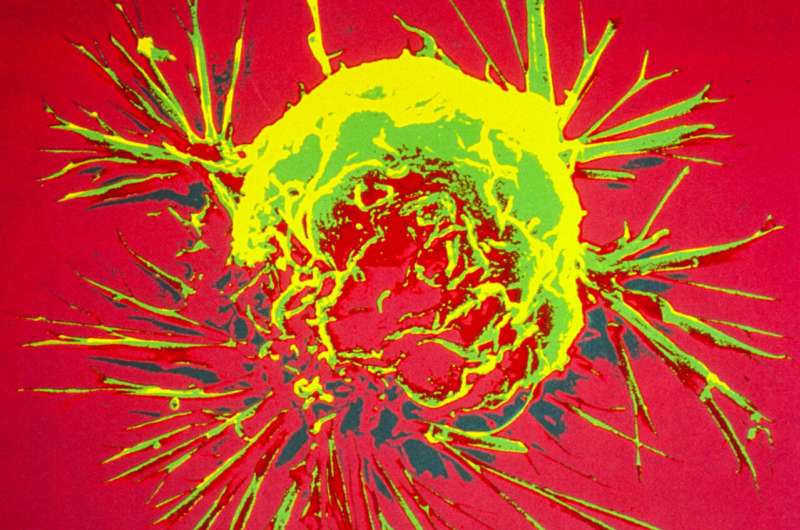Promising new research on aggressive breast cancer

Better treatments of HER2-positive breast cancer are closer at hand, thanks to new research by a team led by Université de Montréal professor Jean-François Côté at the cytoskeleton organization and cell-migration research unit of the UdeM-affiliated Montreal Clinical Research Institute.
Published in PNAS, the journal of the U.S. National Academy of Sciences, the new research by Marie-Anne Goyette, a doctoral student in Côté's laboratory, reveals a highly promising therapeutic target to counter the HER2-positive breast cancer.
In HER2-positive breast cancer, a gene called HER2 is expressed that promotes an aggressive form of the disease. Affecting 20 percent of women suffering from breast cancer in Canada, the HER2-positive subtype is associated with a poor prognosis.
What threatens the life of the majority of cancer patients is the power of tumor cells to spread and thus metastasize to other organs, which can interfere with vital body functions. Increasingly, personalized medicine has generated a lot of hope for patients expressing the HER2 gene, but relapses are frequent in many.
Immunotherapy is an important avenue for treating these drug-resistant patients, but so far with little apparent benefit. As a result, researchers are trying to deepen their understanding of the tumors' immune environment and thereby better target the treatments and those most likely to respond to them.
It is with this in mind that Côté's team studied an important phenomenon in solid tumors called hypoxia. Hypoxia is manifested by a lack of oxygen caused by the rapid growth of the tumor, and leads to the production of metastases, a weakened immune system and resistance to treatment. In short, by making tumors more aggressive while reducing the body's ability to defend itself, hypoxia promotes cancer progression, which can be fatal to those affected.
In a preclinical model, the IRCM team identified a protein called AXL whose action is crucial for hypoxia to take place. By blocking the action of this protein in the tumor, using various novel techniques, the team observed a recovery of blood vessels and a revitalization of the tumor's immune environment. Blocking the action of the tumor also reduced its ability to metastasize in other organs.
"It's as if we had succeeded, on the one hand, in breaking down the protective walls of the tumor against the immune system, thus making it more vulnerable to immunological treatments, and, on the other hand, in preventing the tumor from moving elsewhere," said Goyette, the new study's first author.
The potential of this study is all the more important as it opens the way for further research on the subject from the perspective of various fields of biomedical research, the researchers believe. The sharing of expertise has once again proved its worth, they say.
"Cutting-edge personalized medicine in immunology has faced significant resistance from this type of cancer and we had the expertise in molecular research to help overcome these obstacles," said Côté. "We have not only shed light on a central mechanism of the functioning of some of the most aggressive tumors, but in doing so we have also unveiled a way to create an environment conducive to more effective treatments."
More information: Marie-Anne Goyette el al., "Targeting Axl favors an antitumorigenic microenvironment that enhances immunotherapy responses by decreasing Hif-1α levels," PNAS (2021). www.pnas.org/cgi/doi/10.1073/pnas.2023868118

















